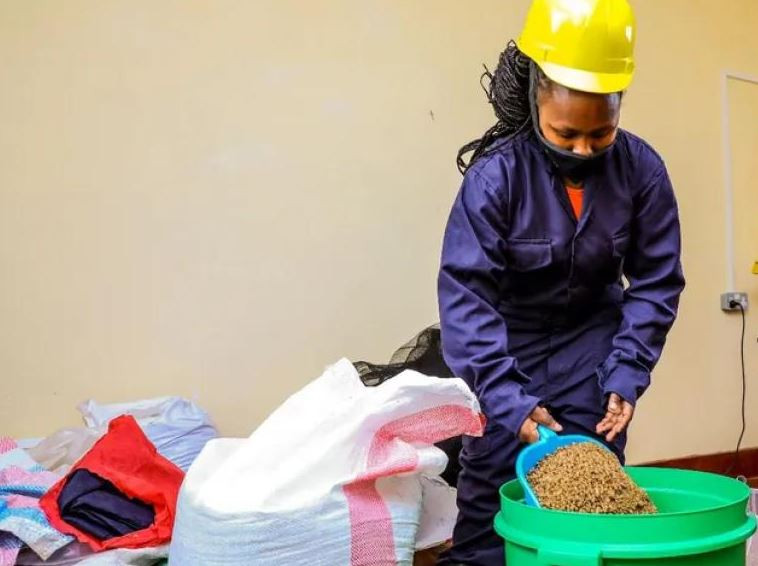
Tell us about your venture and the products you make out of fish waste.
Sea Ventures offers a brand of products called Zuri feeds. We make quality organic animal feeds and fertilisers from fish waste. We reutilise the disregarded fish waste to help tap the un-targeted waste in the blue economy and in fish value chain. We work with the fisher folk fraternity in the collection of the fish waste. This fisher folk fraternity include fishermen, Beach Management Units (BMUs), fish processing companies, fish vendors and the mama Karangas. We up-cycle fish waste to process animal feeds which include chicken feeds, fish feeds, pig feeds and pet feeds.
What does the entire process entail?
In our daily routine operations, we collect the fish waste from fishermen and we take it for processing in our at the required standards.
For many people, this would be an ingenious way to make money. What exactly motivated you into this venture?
Being a marine biologist in the fish industry value chain, I could see a lot of post-harvest losses in fishing which happened to fishermen. This was either after fish processing or through the non-targets and by-catches. Do you know that 60-70 per cent of a fish goes to waste and only 30-40 per cent is taken in either during fish processing or when someone is eating fish? From this, a lot of post-harvest losses take place in the blue economy and in the fish value chain. So there is a need to reutilise this waste. On the other hand, due to scarcity of animal feeds in Kenya, I was really motivated to bridge the gap by helping farmers get animal feeds at a cheaper price. It has really been a process and we have not been able to satisfy the needs of farmers as the demand is high. We are, however, on the right track.
Briefly, take us through the journey of starting your venture.
The idea was born in 2022 and the venture was officiated in January 2023. We started by generating prototypes. We now have products which need to be certified.
We have been able to produce several products like chicken feeds, fish feeds, pig feeds and pet feeds. We have also bought machines which can produce 500 kilos per hour and we are also planning to upscale. Gladly, we have attended training and also won several awards and funding from different organisations. We are also aiming higher and hopeful for the best.
Who are your clientele at the moment? The direct beneficiaries of our products are the poultry farmers, fish farmers, pig farmers and pet owners.
Who are your competitors and how do you deal with them?
Competition is always there but the demand of animal feeds right now is quite high. This is because there is scarcity of animal feeds in the country.
Any plans to advance into other regions in Kenya?
We have future plans. After establishing animal feed plant line factory, we could be able to open depots in other regions. Our goal is to open different outlets of the supply of the animal feeds.
Any major challenge you have encountered so far in your business?
Our major challenge currently is lack of advanced machinery for processing animal feeds. The business project is capital intensive, including the buying of the machines and equipment. We also need an injection of more capital to develop the business, which we don’t have currently. Another thing is that handling of fish waste is quite tricky because of its nature and perishability. In light of this, we also require equipment which could store it well to avoid spoilage.
What makes your venture unique from other similar ones?
Beside our animal feed products being organic, we offer extension services to the farmers by training them on sustainable fish farming. We also do site visits to our farmers to know the impact of our feeds. What is more, we process the products according to the standards and formulation required. Don’t forget that our products are also cheaper, safe, nutritious and easily digestible.